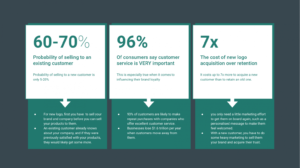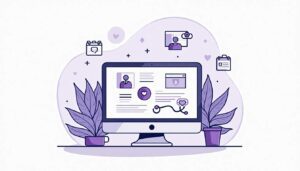5 Smart Strategies That Help Avoid Losing Loyal Customers
16 Nov 2021 By: Natalya Bucuy
Updated
Ah, the moment when you, as a small business owner, sign on a new customer!
You go through the onboarding process and get the client set up and settled in. You get excited about the upcoming opportunity. Maybe you share a round of high fives with your team or celebrate with a happy dance in the middle of the office. (What, no one else? Just us? Oh ok…)
Then some time goes by, you go on with your daily activities, focus on getting more clients, and grow your business. Then one day you realize that that client you were so excited about is…well, no longer your client. Somehow, at some point, the customer stopped coming back to patronize your store or cancelled his or her subscription. You might even learn that that customer is now your competitor’s customer! On, no! What happened?! You feel like a dummy for losing the customer (and perhaps not even realizing it).
Losing customers is heartbreaking for a small business owner. It is even more so if we take a look at customer retention analytics. After all, it’s so much harder and so much more expensive to sell to new clients as opposed to existing customers.

And so the important task for businesses is to retain their customers as much as possible. How? Well, that’s a good question. And we asked some experts to share their best tips on how to gain customer loyalty.
Here are five strategies that can help avoid losing loyal customers.
Know Your Customer Better Than The Back Of Your Hand
First of all, knowledge is power. Especially when it comes to customers.
In his new book Brand Hacks, Emmanuel Probst explains the importance of collecting, analyzing, and activating data that brands own about their customers (first-party data). He believes that understanding customer behavior can help avoid losing loyal customers.
“Ask customers how, when, and why they use the brand’s products,” Probst says.
He offers a great example of data collection and use.
“When a consumer buys razor blades at Costco, Gillette doesn’t know anything about his shaving habits. In contrast, Dollar Shave Club knows about its members’ skin type, how frequently they shave, and the pages they visit on its website. From there, the brand can cross-sell and upsell companion products that will come across as relevant and helpful to the customer. How about an aftershave for a customer with sensitive skin? Or a shaving oil that matches the scent of the member’s shaving foam?”
“First-party data enables brands to establish a win/win relationship with their customers. On one hand, the customer is presented with products that are timely and relevant. On the other hand, the brand retains and grows its most loyal customers with thoughtful and purposeful offers.”
~Emmanuel Probst, Global Lead at Ipsos
Companies can collect first-party data through various sources. They include analytics from website, app, and/or product, CRM-stored data, social media, subscription-based emails or products, customer experience surveys, and other customer feedback sources (Hubspot)
Use Your Healing Powers and Make it Right
It’s inevitable. Businesses are run by people and people make mistakes. So sometimes things will go wrong. Dealing with angry clients is not an easy task, but doing it the right way can help avoid losing loyal customers.
Harrison Tanner Baron, CEO of Growth Generators offers the following tips for high-stress situations.
- First, remain calm. Two angry or upset people are worse than one.
- Second, be understanding. Use a soft tone of voice. This helps keep people from getting very angry because you aren’t matching their energy.
- Third, apologize. Regardless of who is wrong in the situation, it’s easy to apologize and take the blame. Once the customer understands they aren’t wrong, even if they might have been, it now allows you to move forward with a solution.
- Fourth, make it right. Do what you can to make the situation right. If your company did mess up, go out of your way to do something nice for teh customer. It’s easy to send someone an edible arrangement or buy them lunch on Doordash. It makes a world of difference to the customer. Going above and beyond for customers like that can turn them into raving fans. It will remove their desire to spread negative information about your business. And, therefore, help you avoid losing loyal customers.
Writing an apology letter is another great way to make things right. Here is an example of a successful one from customer experience expert Shep Hyken.
Talk, Nurture, Evolve to Avoid Losing Loyal Customers
Aside from using customer feedback for upselling and cross-selling purposes, the process of asking for feedback has its own powers.
David Batchelor, President of DialMyCalls, recommends having account representatives send out a bi-weekly follow-up. The email should ask if there is anything your customers wish you could do differently. This strategy can help constantly update products or services for the better. That, in turn, will surely keep customers happy, he says.
“Nobody has a perfect product or service and customers will be quick to tell you what they wish your service or product could do, even if they are loyal customers.”
~David Batchelor, President of DialMyCalls.com
In addition to reaching out to customers, Batchelor also recommends keeping an updated blog that shows everyone new additions or bug fixes to products and services.
Offer More Than Products: Add Value and Engage Audiences
Going further than just collecting feedback. Add more value that goes beyond products and services and continue growing as a brand.
Who said you only need to be in contact when customers shop?
Creating a community, engaging audiences, and adding value beyond products can do wonders for brand recognition. And brand recognition definitely helps avoid losing loyal customers.
Tori Bell, General Manager of Automate My Outreach suggests adding a personal touch to customer communications whenever possible. As an example, she recommends setting up a dedicated, loyal customer Whatsapp group. She suggests using the group to check-in with customers, seeing how they are doing, and otherwise engaging with them.
“Ask if there are any specific products they need or will be needing soon,” she says. “That way, you can make sure you have stock available. Enquire as to which products they like, what you need to get more of, any changes they can suggest, and any products they would like you to stock. Ask them to be completely honest, explain that you value all feedback, good or bad. Customers in a Whatsapp group can also get ideas from other customers and see what other customers are ordering, which can increase sales.”
Express Authenticity Through Empathy
Authenicity is gold when it comes to any relationship. That includes relationships brands build with their customers. To avoid losing loyal customers, it’s important to stay authentic, regardless of the changes the brand undergoes or trends it decides to follow.
Michelle Clarke, CEO of Empowerment Empires says that authenticity and connection come from deep empathy for customers. She advocates understanding teh customers so deeply that it becomes possible to know what they are thinking before they can express it fully themselves. Such extreme personalization can come from extensive customer journey mapping and research into customer behavior.
“Customer loyalty is a given when you really understand and serve your clients from the heart. The world is full of fakeness, and your clients respond to being treated like an intelligent person with feelings. They know when they are being misled, sold to, or duped, and they do not appreciate it.”
~Michelle Clarke, CEO of Empowerment Empires.
Avoid Losing Loyal Customers by Knowing Your Customers
If you noticed anything that is common in the advice and examples above it is the necessity of deep understanding of the customers and their behaviors. Through examining data, seeking and using customer feedback, remedying sticky situations, adding non-product-related value and engaging with audiences, and being authentic, brands can avoid losing loyal customers.


